Title: SFS Programs and Centers Celebrate Anniversaries, Look to the Future
Center for Latin American Studies (CLAS)
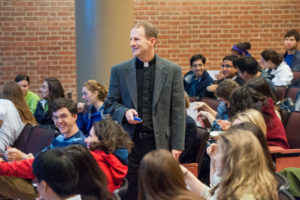
Founded in 1959, CLAS is celebrating its 60th anniversary this academic year. The Center is dedicated to fostering cross-disciplinary research in Latin American affairs and was established in response to key geopolitical events that determined the region’s role in 20th century international relations. As Father Matthew Carnes, S.J., Director of CLAS, explains, “CLAS traces its history to 1959, emerging as one of the very first university centers in the United States to respond to the Cuban Revolution and the momentous period of social, political and economic change that would follow.”
In the six decades since its founding, CLAS has produced more than 1,200 graduates who bring their expertise in the region to their various fields, ranging from diplomacy to advocacy and the private sector.
Today, CLAS scholars are at the forefront of responding to new issues that are shaping Latin America at a time when, according to Carnes, the region “has seen a rise of democracy and economic development that is unparalleled in history. Yet, at the same time, democratic governance and economic growth have struggled to fully deliver on their promise of opportunity and rights for all.” To understand this new context, Carnes says, CLAS is “eager to embrace issues that were largely unrecognized at the time of our founding; in particular, care for the environmental richness of our planet and respect and appreciation for the diversity of races, cultures and gender expressions in our hemisphere.”
Center for Eurasian, Russian and Eastern European Studies (CERES)
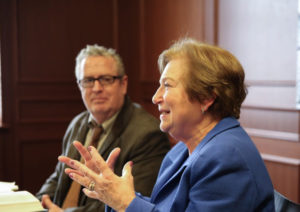
CERES is also celebrating its 60th anniversary this year. Founded as the Russian Area Studies Program, CERES was established during the Cold War to develop scholars and practitioners who could understand the complexities of the Soviet Union.
CERES has long served as an important hub where experts and leaders can develop the skills and experience they need to work in the region. Professor Angela Stent, Director of CERES, explains that from the Center’s earliest years, “a lot of the people in the government and intelligence community were sent to Georgetown to do this degree and get the language skills.” CERES graduates—one of whom is former Secretary of Defense Robert Gates (PHD ’74)—have gone on to work at the State Department, Department of Defense, intelligence agencies and the private sector.
With the fall of the Soviet Union in 1991, CERES reoriented its mission to reflect the region’s new geopolitical reality. “We’re still covering the same area, but now it’s fifteen independent countries,” Stent says. Today, in addition to focusing on post-Soviet states, CERES faculty, students and alumni work on issues affecting countries across Central and Eastern Europe and Turkey.
As Russian involvement in U.S. domestic politics grows and the country reemerges as a global player, Stent has seen interest in CERES rise in recent years. The Center has adapted its curriculum to address the contemporary issues affecting regional affairs, including teaching technological skills and data literacy.
African Studies Program (AfSP)
The African Studies program was founded 40 years ago in 1979, when James Moone, a visiting professor from the Department of Health, Education and Welfare, established a new program dedicated to the study of Africa. Describing his motivations for founding the program in a Hoya article, Moone said, “For too long African Studies have been placed on the back burner. With Africa coming into its own, however, it is becoming increasingly important that we have well qualified representatives in Africa.”
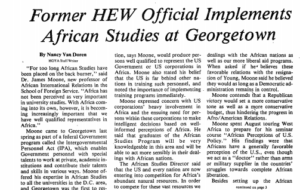
AfSP seeks to illuminate the ways in which Africans at the national, community and individual level interact with a changing global environment. This emphasis on a multiplicity of experiences and approaches is a direct attempt to challenge stereotypes in U.S. higher education that Professor Scott Taylor, Director of African Studies, says have constructed the continent as a monolithic entity, defined by “crisis narratives.” Taylor explains that the program is dedicated to “dealing with a much more diverse set of issues and challenges but also opportunities.”
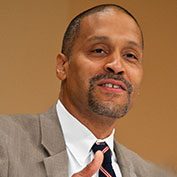
Looking to the future of the program’s mission, AfSP hopes to introduce more funding, study abroad opportunities and new language classes to combat a tendency for interest in area studies to wax and wane with crisis and headline-making events. Taylor argues that it is important not to “lose sight of the importance of whole regions of the world with which we, as global citizens, have to interact at some level or another.”
Asian Studies Program
This spring, the Asian Studies program is celebrating its 40th anniversary. Founded in 1980, the program has been a key player in grappling with questions of geopolitics and U.S. strategy in Asia, especially with regard to the rise of China and growing tensions in Asia. To remain at the cutting-edge of these trends, the program has recruited a number of professors with real-world policy experience. Core faculty members such as Director Michael Green, Evan Medeiros, Victor Cha, and Dennis Wilder boast experience in the CIA, the National Security Council and the White House.
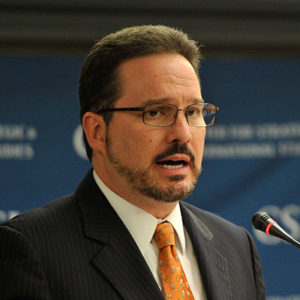
Expanding the range of experience and expertise of the program’s faculty has been crucial to effectively training graduates who can meet the increased demand for regional specialists in government, policy and business. Green stresses that the program helps students to think about traditional areas such as culture, history and comparative politics but also “to apply the tools of economics or business negotiation or international relations theory in a very practical way.”
Going forward, Green wants to expand scholarships to build a more diverse student body. “We’d like Asian Studies to look like America, and that requires scholarships to be competitive with other schools,” he says. He hopes to create an endowed center for Asian Studies, which he says, “will make us a center for excellence, not only for educating the next cohorts of leaders across the Asia-Pacific, but also being a center for the most advanced research and discussion.”
BMW Center for German and European Studies (CGES)

It is no coincidence that the BMW Center for German and European Studies shares a 30th anniversary with the fall of the Berlin Wall in 1989. According to CGES Director Katrin Sieg, the German government earmarked Georgetown to be the location of one of three centers of excellence that would help to maintain and strengthen transatlantic relations in the new European political landscape. “We are told that Helmut Kohl [the then Chancellor of Germany] himself was in favor of putting one of the centers at Georgetown,” she says.
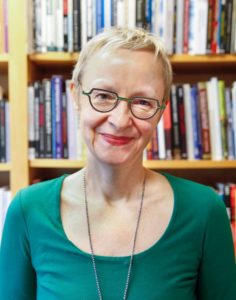
The seed money for CGES came from the German government and later from a significant gift from the BMW Corporation. This monetary support has allowed the Center to explore, through its Masters program and public events, contemporary European affairs and U.S.-Europe relations. Sieg says that, although the transatlantic partnership is facing challenges that are unprecedented in the Center’s history, “our students are still confident that, despite these tensions, the need for experts who can maintain the partnership and contribute to the alliance will be all the more urgent in the future.”
Further strengthening its support for students is one of the Center’s goals moving forward, which Sieg believes is made all the more possible by CGES’s small size. “CGES gives [students] great access to [their] professors, close working relationships, conducting research…all of that is possible because regional studies centers are small,” she says. This in-depth and dedicated study is crucial so that graduates know that “Western countries have to work together with each other and with the rest of the world to contend with the many, many political challenges that are confronting all of us: climate change, migration, inequality.”
Georgetown Journal of International Affairs (GJIA)
The youngest in this year’s anniversary cohort, the Georgetown Journal of International Affairs celebrates its 20th anniversary this year. Upon establishing the student-edited Journal, GJIA’s founder Jeremy Goldberg (SFS’99) said he “envisioned a peer-reviewed publication that would contribute to the global academic dialogue by addressing world affairs from a fresh perspective.” Partnering with MSFS students, deans and faculty, he said that the “energy, passion and incredible dedication” of the students who published GJIA’s first issues enabled the journal to compete with its professional counterparts.
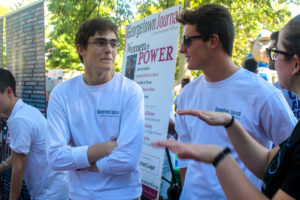
Since its first issue in the spring of 2000, the student-edited publication has become a resource for professionals, academics and students and is indexed online in academic databases and sold in more than 300 retail outlets. Its impressive list of contributors includes IMF Managing Director Michel Camdessus, CEO of Coca-Cola Douglas Ivester, preeminent political theorist Kenneth Waltz, former U.S. Secretary of State Madeleine Albright and Director of the Peace Corps Carrie Hessler-Radelet.
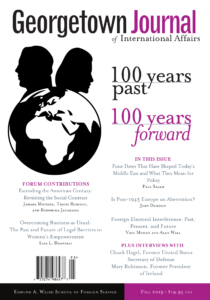
Despite considerable changes in the landscape of international affairs, current Editor-in-Chief of GJIA Aaron Baum (SFS’20) is confident in the publication’s ability to stay relevant. Its staff is invested in making sure that the journal’s content and format keep up with technological advances. Between 2011 and 2018, GJIA published a series of issues entirely dedicated to the role of cybertechnology in international affairs, while Goldberg anticipates that the journal will “continue to evolve over the next ten to twenty years in how content may be created and consumed in the future, such as AR and VR.”